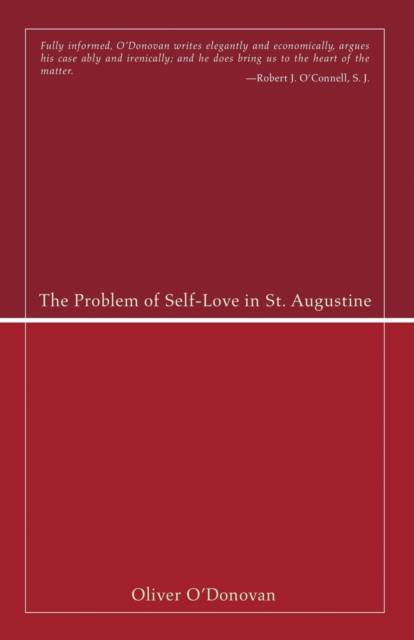
- Retrait gratuit dans votre magasin Club
- 7.000.000 titres dans notre catalogue
- Payer en toute sécurité
- Toujours un magasin près de chez vous
- Retrait gratuit dans votre magasin Club
- 7.000.0000 titres dans notre catalogue
- Payer en toute sécurité
- Toujours un magasin près de chez vous
Description
The primal destruction of man was self-love. There is no one who does not love himself; but one must search for the right love and avoid the warped. Indeed you did not love yourself when you did not love the God who made you. These three sentences set side by side show why the problem of self-love in St. Augustine of Hippo constitutes a problem. Self-love is loving God; it is also hating God. Self-love is common to all men; it is restricted to those who love God. Mutually incompatible assertions about self-love jostle one another and demand to be reconciled. --from the Introduction In saying that self-love finds its only true expression in love of God Augustine is formulating in one of many possible ways a principle fundamental to his metaphysical and ethical outlook, namely that moral obligation derives from an obligation to God which is at the same time a call to self-fulfillment. --from the Conclusion Some thinkers never become unimportant; some topics always repay renewed attention. St. Augustine is such a thinker; self-love is such a topic. It is, therefore, good that Oliver O'Donovan's analysis of the problem of self-love in Augustine's thought is again in print and available for study. It is a careful unraveling of the development of Augustine's thinking on self-love, and it is also an important guide for our own attempts to probe various aspects of one of the most complicated problems in the moral life. --Gilbert Meilaender Duesenberg Professor in Christian Ethics Valparaiso University, and author of The Way That Leads There: Augustinian Reflections on the Christian Life (2006) Few people in the last thirty years have done more than Oliver O'Donovan to make Augustine a living, breathing source for Christian moral reflection. With the increasing recognition that deep confusion about love lies at the heart of modernity's pathos and with renewed attention being paid to the nature of love in all its personal, social, and ontological dimensions, the recovery of Augustine's profound insights has become an urgent matter. The re-issue of this seminal work is thus both timely and important. --Michael Hanby Assistant Professor of Theology, Honors College Baylor University, and author of Augustine and Modernity (2003). Oliver O'Donovan is Professor of Christian Ethics and Practical Theology at the University of Edinburgh. He is the author of numerous books including Resurrection and Moral Order (1986), The Desire of Nations (1996), and The Ways of Judgment (2005).
Spécifications
Parties prenantes
- Auteur(s) :
- Editeur:
Contenu
- Nombre de pages :
- 230
- Langue:
- Anglais
- Collection :
Caractéristiques
- EAN:
- 9781597529532
- Date de parution :
- 01-11-06
- Format:
- Livre broché
- Format numérique:
- Trade paperback (VS)
- Dimensions :
- 161 mm x 216 mm
- Poids :
- 244 g

Les avis
Nous publions uniquement les avis qui respectent les conditions requises. Consultez nos conditions pour les avis.






